For most upper-level courses, the prerequisite is six credits of second-year English, third-year standing, or by permission of the instructor. See prerequisites for individual courses.
Fall 2025
| Course | Course Description | Degree Requirement | Professor |
|---|---|---|---|
| 300 | Backgrounds to English Literature | Literature and Tradition, pre-1700 | Surkan |
| 312 | History of Critical Theory | Literature and Criticism | Roberson |
| 326 | Topics in Globalization and Literature | Literature and Culture | Stephens |
| 328 | Gender and Sexuality in Literature | Literature and Culture | Stephens |
| 329 | Topics in Children's and Young Adult Literature | Literature and Culture | Grafton |
| 330 | Topics in Speculative Narrative | Literature and Culture | Burgoyne |
| 340 | Topics in Medieval Literature | Literature and Tradition, pre-1700 | Masson |
| 346 | Topics in 17th-Century Literature | Literature and Traditions, 1700-1900 | Atkinson |
Spring 2026
| Course | Course Description | Degree Requirement | Professor |
|---|---|---|---|
| 310 | Topics in Rhetoric | Literature and Criticism | Lane |
| 325 | Topics in Environmental Literature | Literature and Culture | Smith |
| 334 | Topics in Canadian Literature | Literature and Culture | Moosa |
| 348 | Topics in 18th-Century Literature | Literature and Traditions, 1700-1900 | Burgoyne |
| 352 | Literature and Traditions | Finigan | |
| 394 | Topics in Television Narrative | Word and Image | Watkins |
| 396 | Literature and Film | Word and Image | Armstrong |
Note: Any course descriptions or reading lists here are tentative. Check back for updates.
Course Descriptions: Fall 2025
ENGL 300: Backgrounds to English Literature
Professor Neil Surkan
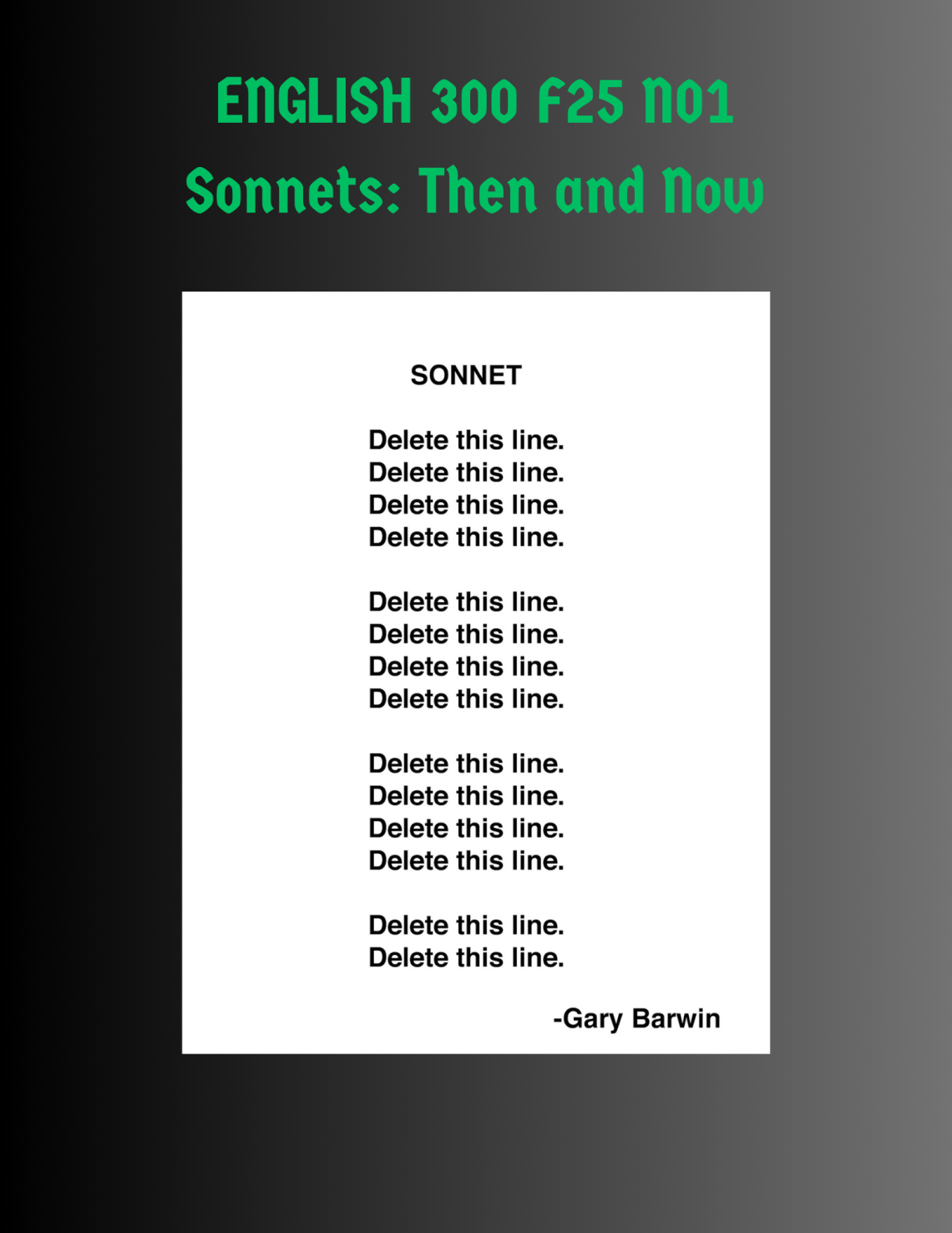
“How do I explain / this restless search for beauty or relief?” *
The Sonnet: Then and Now
This course will provide students with a history of the sonnet, one of poetry’s most popular and flexible forms, before focusing on its notable popularity in the present. Beginning with an overview of two historical sonnet forms, we will proceed through the centuries, studying shifts in focus, intention, and convention, until we arrive at our contemporary moment, where the sonnet form persists, transforms, and continues to fascinate poet and reader alike.
What are the risks, and what are the rewards, of parcelling a heartache, quandary, or event into a “little song”? What is it about a poem with a turn (or “volta”) that feels so satisfactory? And at what point does the sonnet form, itself, stretch beyond recognition?
*Diane Seuss, Frank: Sonnets
ENGL 312: History of Critical Theory
Professor Mike Roberson
This historical survey of literary theories from Plato to the Moderns will rely on two broad approaches. First, we will consider aesthetic and literary statements from the perspective of M.H. Abrams and his four orientations of literary theory. These orientations—the mimetic, the pragmatic, the expressive, and the objective—offer an historical and a practical approach to understanding criticism. Second, we will consider aesthetic and literary statements as they engage in a long history of attacks against and defenses of art and literature. This dynamic will help show how art and literature has always manifested out this fight between convention and innovation. Along the way, we will explore how literary theories reflect and challenge the politics and philosophies of their times.
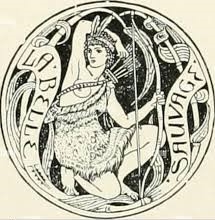
Emblem from the cover of Sir Philip Sidney’s A Defence of Poesie and Poems, 1891 Cassell & Company ed. Source: Project Gutenberg. https://www.gutenberg.org/files/1962/1962-h/1962-h.htm
ENGL 326: Topics in Globalization and Literature
Professor Melissa Stephens
A study of literary and cultural responses to globalization. Content may vary from broad issues, such as human rights, multiculturalism, diasporas, and economics, to specific topics, such as food production, terrorism, urbanism, and censorship.
ENGL 328: Gender and Sexuality in Literature
Professor Melissa Stephens (She/They)
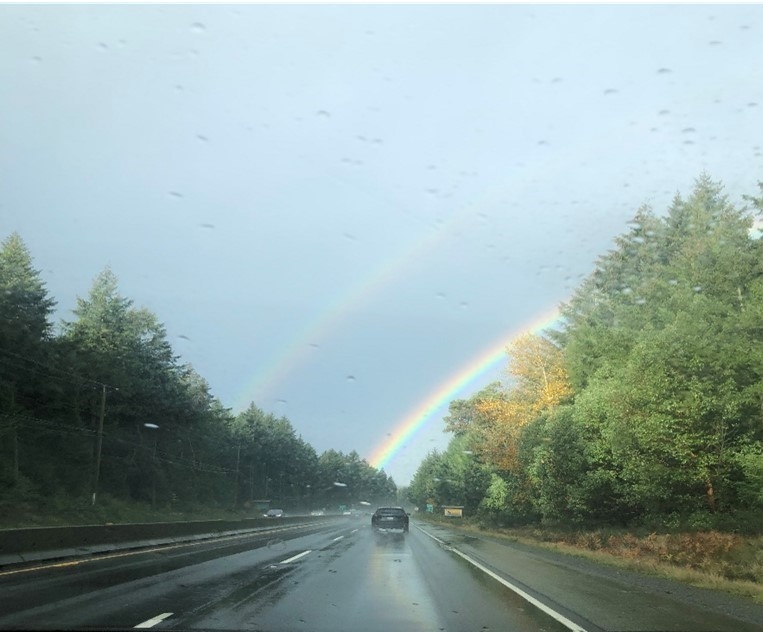
“Can anyone of us here still afford to believe that efforts to reclaim the future can be private or individual? Can anyone here still afford to believe that the pursuit of liberation can be the sole and particular province of anyone particular race, or sex, or age, or religion, or sexuality, or class?
Revolution is not a one-time event. It is becoming always vigilant for the smallest opportunity to make a genuine change in established, outgrown responses; for instance, it is learning to address each other’s difference with respect.”
Audre Lorde, “Learning from the 60s.”
“Why should it be that if somebody walks a certain way they are discriminated against? Well, boys don’t walk that way, or girls don’t walk that way. Or if somebody appears in clothing that doesn’t conform to their gender assignment? Why would that be a problem? Why can’t that be a small and beautiful space of freedom? Right? Why wouldn’t we want that for our children?”
Judith Butler, “The Future of Gender Politics.”
English 328 focuses on written and visual narratives of gender and sexuality by authors from 2SLGBTQIA+ communities. The course content will call us to explore relationships between freedom and oppression, joy and trauma, and peace and violence, as we examine topics ranging from parenting and childhood to education, art, and activism. We will engage with intersectional analyses of past and present violence experienced by gender diverse communities, particularly as the authors signal it, and we will discuss their insights into practices of mutual aid, care, and liberation.
ENGL 329: Topics in Children's and Young Adult Fiction
Professor Janet Grafton
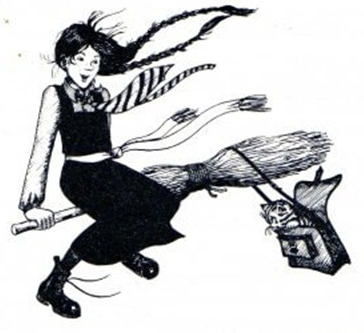
The figure of the witch is experiencing a resurgence in contemporary literature, and "witch lit" has become a popular sub-genre. In this course, we will engage in a survey of children’s and YA fiction and trace the reinvention of the witch from evil to empowered within these genres. Conducting close readings from a range of literary formats, we will explore what this cultural shift reveals about attitudes to and relationships with gender, power, and age.
Possible readings could include fairy tales such as Baba Yaga, Baum’s The Wonderful Wizard of Oz, Dahl’s The Witches, Murphy’s The Worst Witch, Leyh’s Snapdragon, and Ostertag’s Witch Boy.
ENGL 330: Topics in Speculative Narrative
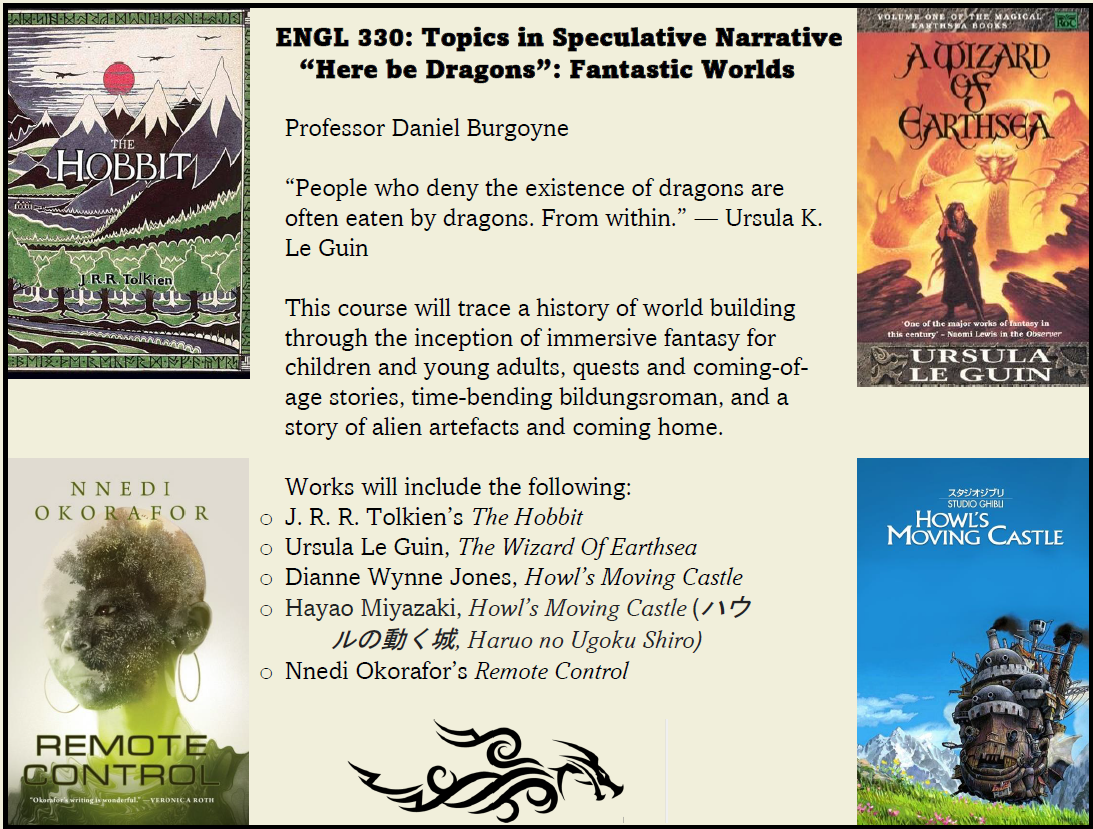
ENGL 340: Topics in Medieval Literature
The Canterbury Tales (by Geoffrey Chaucer)
Professor Cynthea Masson
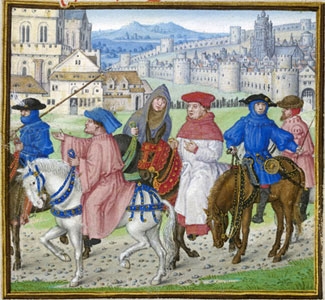
By the end of ENGL 340 you will have gained not only a new appreciation for medieval literature but a skill you can use to impress your friends—you will be able to read Chaucerian verse aloud. Try it now:
A knyght ther was, and that a worthy man,
That fro the tyme that he first bigan
To riden out, he loved chivalrie,
Trouthe and honour, fredom and curteisie. (General Prologue 43-46)
Alongside our practice of Middle English, we will examine the plots, themes, genres, and characters of several Canterbury Tales. To contextualize our readings, we will discuss aspects of medieval England, including political and religious beliefs. Assignments will include translation tests, a research paper, a midterm exam, and a final exam. Depending on the number of students enrolled, creative presentations about Chaucer and his works (or, alternatively, dramatic recitations of Chaucerian verse) will be a required component.
REQUIRED TEXT
Chaucer, Geoffrey. The Canterbury Tales. Edited by Robert Boenig and Andrew Taylor, 2nd ed., Broadview, 2012.
ENGL 346: Topics in 17th-Century Literature (Online Asynchronous)
Marrying “America”: Gender, Ideology, and the Rhetoric of Colonization
Anna Atkinson
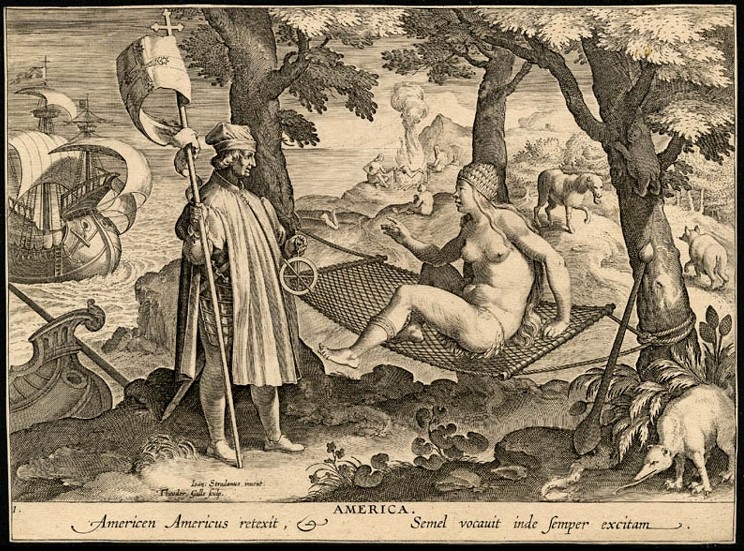
The word “America” appears in quotation marks in the title of this course for good reason. The name given to this continent comes from one of the family names of Vespucci Amerigo. Early cartographers claimed he had “discovered” America before Columbus; certainly Amerigo argued that what he had “found” was indeed “new” land, and not a part of Asia.
Attaching a family name to a purported possession (such as a “new” continent)—particularly one supposed to bring riches and become fertile and productive—would have been suggestive of marriage throughout the colonial period, including the 17th Century. Certainly the metaphor of marriage was played out over and over in the literature of early colonialism. However, it relied for its effectiveness on the notion that the land was “virginal”: unoccupied and unowned.
This course interrogates that metaphor, and looks at the role of language and ideology in the process of colonialism. In a kind of critical literary archeological expedition, we will examine tracts, narratives, speeches, and other documents from both European colonizers and Indigenous peoples, and will introduce modern theorizations about language and colonialism. We will also look at twentieth- and twenty-first-century interpretations of these early writings and metaphors, and examine the extent to which colonial language still informs “American” ideology.
Course Descriptions: Spring 2026
ENGL 310: Topics in Rhetoric (Online Asynchronous)
Professor Richard Lane
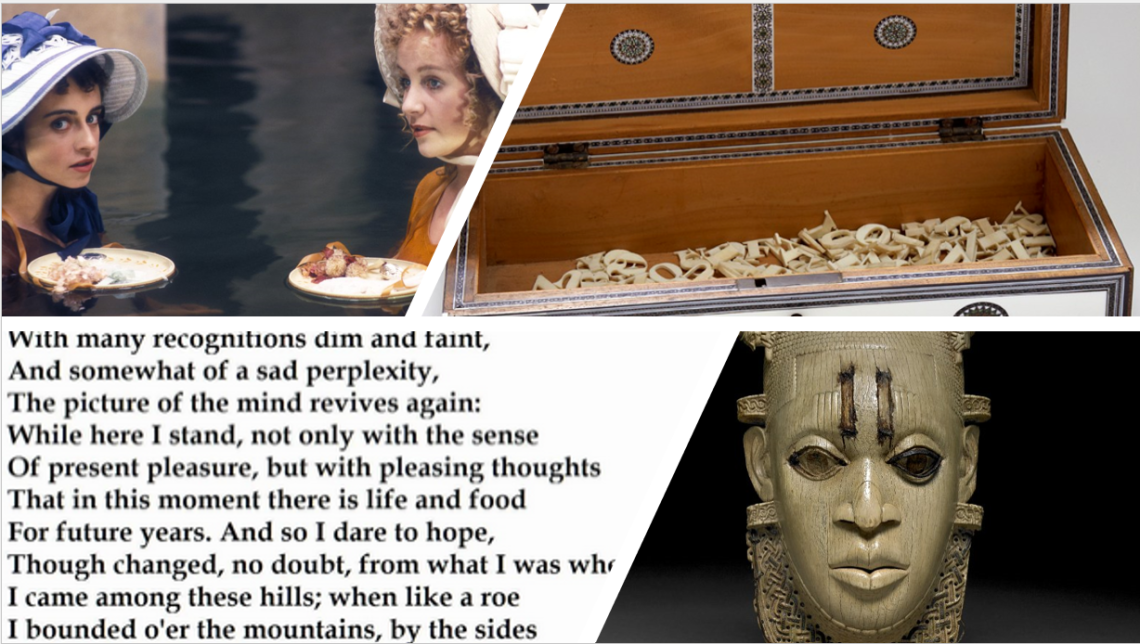
We will explore the topic of rhetoric through one key rhetorical device called ‘ekphrasis,’ which is the representation of art in words, often through a vivid narrative or episode in a text. We will go on a journey of discovery to connect a Benin mask with a staged photograph of indigenous people at Fort Langley and, paradoxically, how this relates to a picturesque scene in a famous poem by Wordsworth (“Tintern Abbey”). We will then go on a gothic journey through the ekphrases of Jane Austen’s Northanger Abbey, complemented by the ekphrastic riddles in Austen’s Emma, before pondering how Woolf managed to write an entire novel focused on a vision of a single lighthouse (in To The Lighthouse). Our aim is to connect cultures without erasing differences, in the process exploring and mapping rhetoric in accessible and understandable ways.
ENGL 325: Topics in Environmentalist Literature
Professor Toni Smith

The Wild and the Wilderness
Although seemingly natural, the construct of “wilderness” is a strange idea. What is the world beyond human society? How can we come to know it, or can we? Is it a dangerous place? An idyllic one? Should we get to know it better? Or stay away?
For North American colonial and settler writers, the wilderness allures and repels, as they are drawn to the mysteries but also seek to tame, know, and control the natural world. For Indigenous writers, is there such a construct as “wilderness” or is it simply home, the place to which humans belong, know intimately, and are eternally co-creating?
Join us to interrogate and explore the idea of wilderness in novels and other texts from North America and beyond.
ENGL 334: Topics in Canadian Literature
Professor Farah Moosa
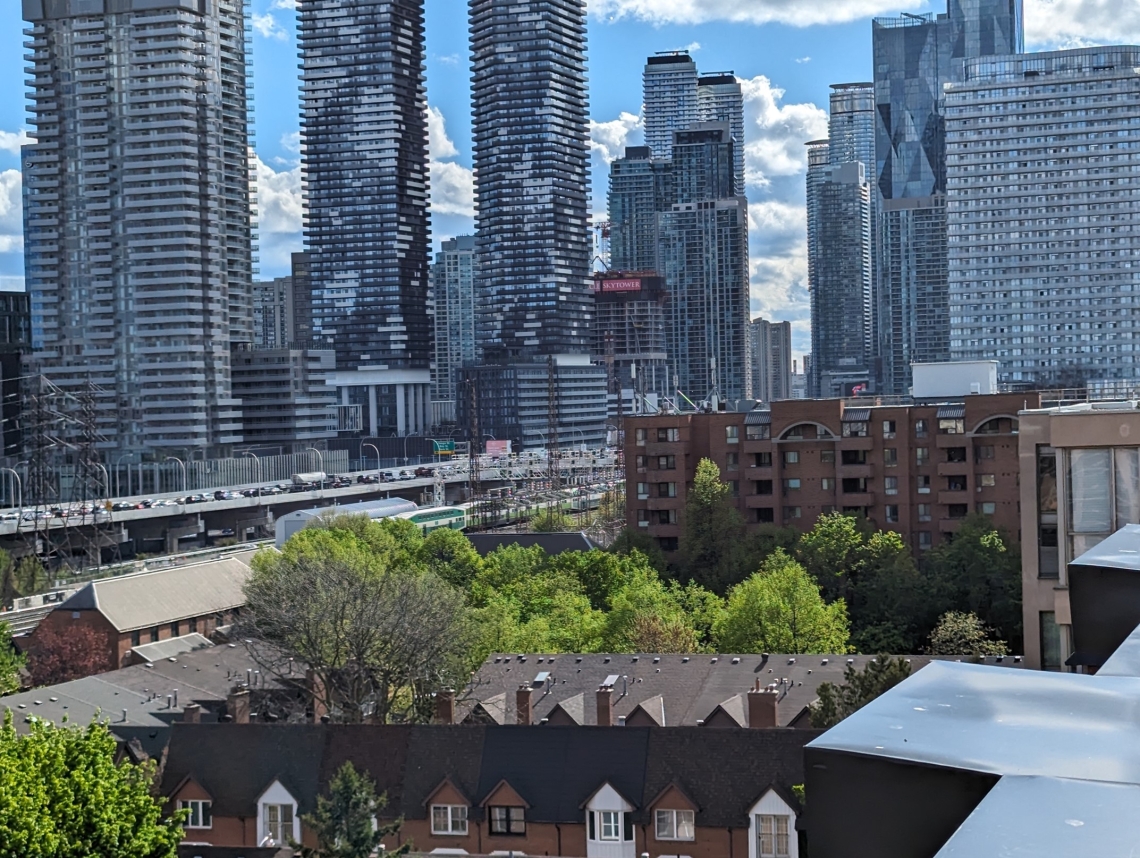
What is cultural memory? Why is it a popular theme in Canadian literature? Join us as we read a range of contemporary Canadian texts that explore the links between memory and identity. We’ll think about how the past informs the present, as well as how the present shapes the past.
ENGL 348: Topics in 18th-Century Literature
Professor Daniel Burgoyne
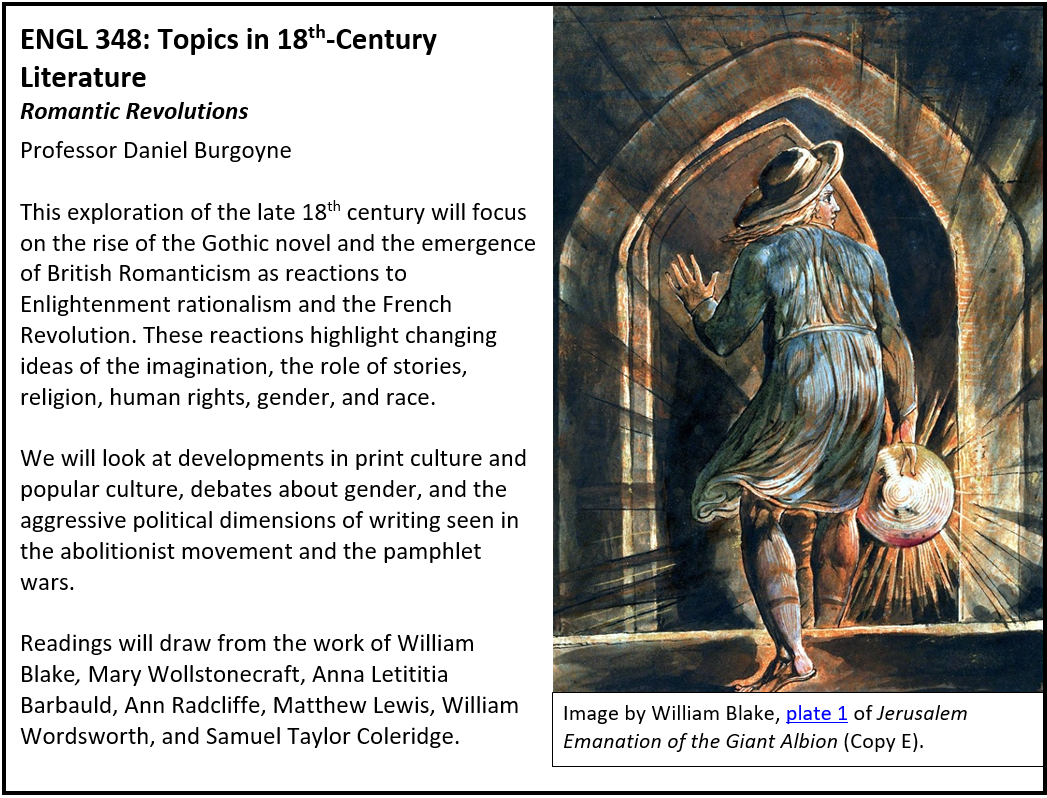
ENGL 352: Topics in 20th-Century Literature
Professor Theo Finigan
A study of 20th-century literature within the broader social, political, philosophical, and cultural contexts of the age. Topics may include Modernism, Post-Modernism, the Harlem Renaissance, 1960s activist literature, and others. Focus may be on a specific author, genre, or literary movement, with texts primarily from outside of Canada.
ENGL 394: Topics in Television Narrative
Professor Paul Watkins
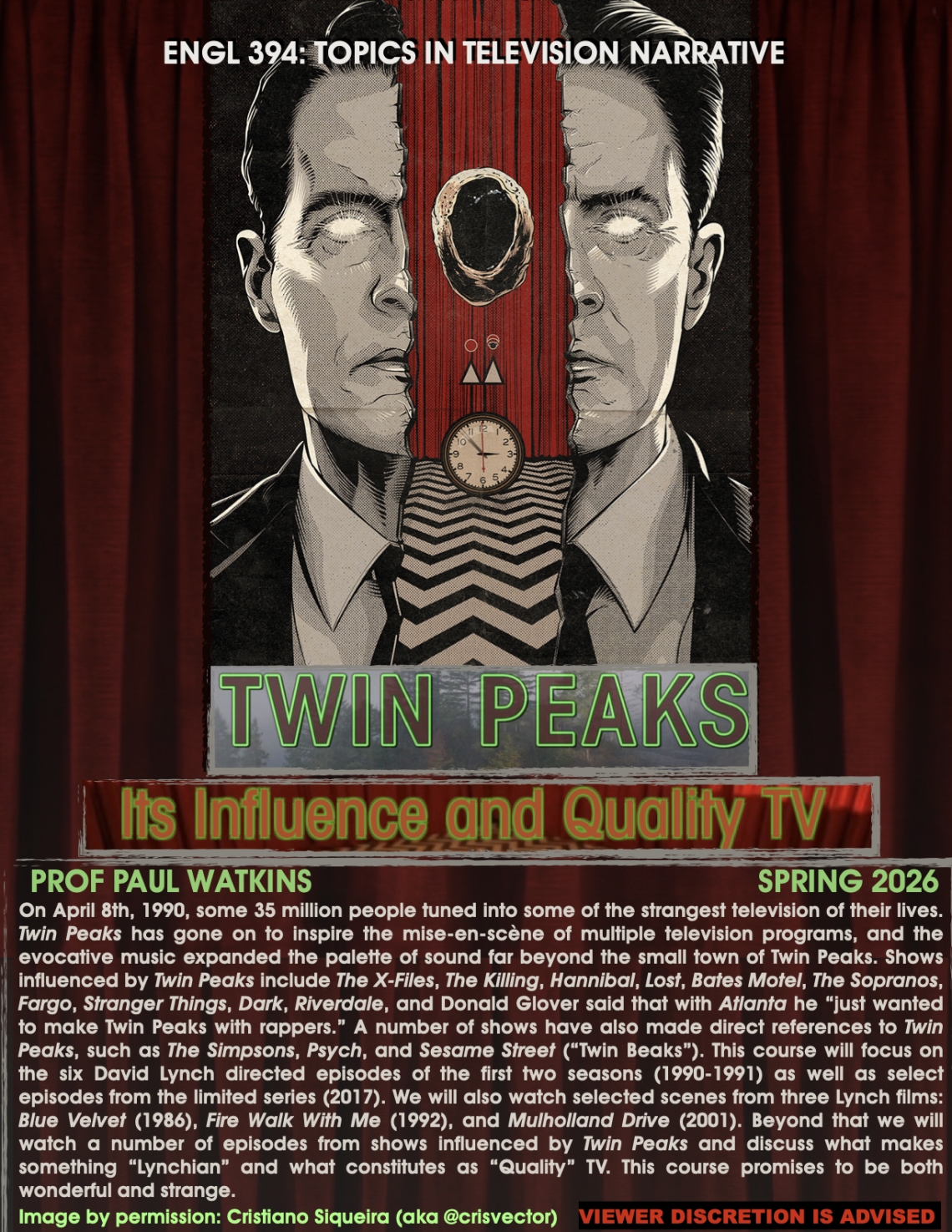
ENGL 396: Literature and Film
Instructor Clay Armstrong
A study of the interrelationships between literature and film. Focus may be on a particular author, director, genre, theme, or region.
Generic course descriptions for all English courses are in the VIU Program and Course Calendar.
